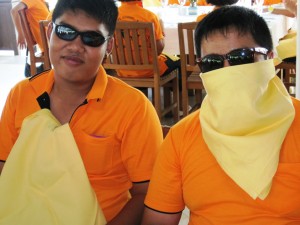In 2009, I was living in Ao Nang and was bored with the rainy season so I decided to head up to Bangkok to have some fun. While beach life is fantastic, it lacks in certain areas such as: live music, theaters, variety of nightlife, and shopping. So, when I need a dose of those things, I head out to the cities. My plan was to go for two weeks, so I stashed my larger bag with a friend locally, packed up a small bag and headed up to BKK.
Somehow two weeks turned into two months!! I wouldn’t have guessed that I would have stayed there that long, but an opportunity came up that I thought would be fun to pursue. My friend Craig was the director of Princeton Review and they needed someone to teach a Business English Pre-course to university students. This would be fantastic! I signed up, went through the training and started the following week.
Surprise! You are a Teacher
Here is the thing about me. While I run an online business, I really don’t like spending all my time online. I really enjoy building relationships, teaching others, and meeting the locals. I have personal-coaching relationships through my Skype calls, but having real live human interaction fulfills a specific need that my business does not. It’s also nice to have something to do during the day since most of my business is run at night. It livens things up, gives me an opportunity to learn something new, and keeps my life more active than it normally would be.
After that six-week course ended, I came back down to Ao Nang I spoke with a local friend of mine who said their daughter’s school was in need of an an English teacher. I thought they were sweet but I didn’t really want to do it. A few days later, my phone rang and I was told there was already an interview set up. I didn’t want to be rude, so I went.
My biggest concern was if I would be able to work by day, and run my business by night. I ended up teaching English one semester, then was asked if I could teach Science (that is what my undergraduate degree is in), and moved over to the private school (EP Program) where all courses are taught in English.
Teach in Thailand
So, let’s start with the Benefits of Teaching:
First off, even if you are employed as ‘Full Time’, it is kind of Part Time. At home, teachers that work 7am-3pm teach that entire time, then take their work home with them. Not so here. In the high schools, you will teach about 17 – 19 hours a week. In between lessons, you have time to grade, prepare, go online, read, etc. While you are meant to stay on campus, some schools are less strict about that rule. It really depends on where you work. But, be warned! You will be asked over and over do do additional work, after school camps, English Weekend Camps, and anything imaginable.
Work Permit
As a Full Time Employee, you get a one year Work Visa (Read: this might as well be GOLD if you want to live here), and Health Insurance. Your monthly salary will be roughly 30,000 Baht a month, which includes about 2.5 months of paid holiday time. Considering you can live BIG here on 20,000—you end up in a good place and able to save and holiday even if you don’t have another side income.
The school will usually take you along on trips and send you to training courses. On some of these I’ve wanted to pull my hair out because I had no idea what was going on, but looking back, they were great cultural experiences that I wouldn’t have experienced elsewhere. You get to see and do things that a normal westerner would not ever be invited to. Cultural Bonus Points.
Generally speaking, the other westerners that choose to live here are cool. I’ve met really great people where I work and it isn’t the same scene as working at home. Most people come here to enjoy the lifestyle, so they are game for adventures, travel, and new experiences.
The Other Side of Teaching
So, before you go ‘round with your resume, there are other things that you should know about it, too. Many of the ‘downsides’ of teaching can be avoided if you first understand culturally where they are coming from. Because I didn’t know any of these things, I found myself (and still do!!) incredibly confused, irritated, and down right pissed off on many occasions. Here are some of the things you should know—and try your very, very best to accept and your time will be much easier and enjoyable.
Most of Thailand is Buddhist. This means, generally, that 1) the future doesn’t really exist, and 2) you only worry about now.
“But,” you might be asking, “how do you plan anything then?” And my answer would be, “Exactly!!”
There is NO Planning
Most of Thailand will get bashed for its lack of organization or planning. As a consultant that focuses on systems and efficiency, this drove me absolutely bonkers (and still does). At home, you would start the year knowing when your holidays are. Not so here. Yes, they will come, and you are likely to be informed maybe a day or two in advance.
“Well, how can I plan anything then!?!” I hear you asking. My response (again): “Exactly!!”
This might cause an overall breakdown in your nervous system. Especially because they have done a school year before, how could they not know this was coming? The thing I’m realizing is that they don’t even think of it unless it is Now. So, you kind-of have to live with that if you are going to teach here.
The Hierarchy and Patriarchy is Real
Secondly, Thailand operates in a hierarchical system. Here’s how this works. By level of respect it goes like this: The King, Government Officials, Monks, Teachers, White collar workers (office jobs), Blue collar workers (laborers or field workers), Children. Males are higher than females. Someone older than you is automatically higher than you.
What does this mean for you? Basically this: (and I just figured this out recently, so God Knows how many people I’ve disrespected—oops!) If someone asks you to do something, you go and do it Now. Drop everything, and go do it. There will be no warning, generally no reason, and no time for you to prepare. But, because it is a respect thing, you have to do it.
(Again, this bent my idea of reality where you question authority, attempt to understand what it is you’re meant to do, and autonomously come up with ways of solving problems … which leads me to another point…)
Group Think
Most things in Thailand are done as a group, as is decision making. I laughingly call it “The Conference”. If you want to change your order in a restaurant, there might be A Conference. If something is going on at school, there will be A Conference. You, being the westerner, will unlikely be invited to The Conference, but you will just find out the results. Thais value groups, so most important things are done in groups like living in groups, eating, going to events, holidays, and even going to the bathroom. You rarely see a Thai person just going off by themselves to do something because they feel like it—which is also why it is shocking to most people that I am here on my own.
Thai teachers will punish the children by hitting them with a stick or cutting their hair publicly. I don’t like this at all, but thankfully, westerners aren’t allowed to do it. The parents find this acceptable, even if you don’t.
Making a Curriculum
You will most likely be responsible for creating your own curriculum and teaching the kids how you want. This can be a really good thing. Last year, I didn’t have books and I really enjoyed the projects I did with the kids and was amazed with their artistic ability. This year, I have a book so it is more structured, but the projects and activities are still up to me. Note: You will not be praised here for your work. The idea of positive reinforcement doesn’t exist here so don’t expect it. Also, you will only hear if you are doing something wrong. This can feel devastating, and uninspiring, but look to your kids for the rewards.
The problem with making your own curriculum and then the school changing everything all of the time is that you cannot follow it. I tried to set my exam and quiz days and the information around it (duh), and was consistently unable to follow it due to the flux of last minute scheduling of the school system. I actually had days where I went to my class to hand out my tests, and there were NO STUDENTS. I checked with the director, “Oh, they go to camp.”
No warning, no notice. And I had spent ages preparing them for an exam that would take place — whenever?
You Cannot Fail Your Students
Generally speaking, you have to pass the kids. There is no such thing as ‘failing’ in this society (which makes grading seem rather irrelevant, but you have to do that too). And, if you factor in the conference thing, you will realize that all of the kids work together in groups and don’t want anyone to fall behind. Needless to say, there is a lot of copying, cheating, and very little original work. The idea of being an independent worker or thinker really isn’t valued here like it is in the U.S. but, in a way, it seems to be a much friendlier approach to learning and living. This is rather refreshing coming from the “If you don’t know something, you’re screwed, and you better go and figure it out all by yourself–pronto!!” approach. The general feel to everything here in Thailand is that you don’t have to worry and if you don’t know how to do something, you will be helped out. Maybe The Conference isn’t so bad after all?
Keep in Mind the Bigger Reward: The Children
As you can see, there are many benefits to teaching here. The biggest reward, by far, are the children. They are amazing, talented, happy-shining-people that love having you there. They are well behaved compared to home, and excited to see you and talk to you in English.
there are many benefits to teaching here. The biggest reward, by far, are the children. They are amazing, talented, happy-shining-people that love having you there. They are well behaved compared to home, and excited to see you and talk to you in English.
Culturally, you are up for a BIG CHALLENGE. Expect to feel frustrated and confused by the lack of shared information. Know that the technology will break and not work. Understand that it is not their way to tell you ‘good job’, but let the kids smiles make up for that!! You have to keep in mind that just by being there and teaching them, you are potentially tripling their income as an adult. Thai English speakers make FAR MORE MONEY than just Thai speakers. Given that most of their opportunities will be in tourism, dentistry, law, medicine or other English speaking professions, you are paving their way towards success.
Final Thoughts
2018 update – In the end, I was very happy for the experience, as it gave me much more insight to the Thai culture. I really enjoyed the children and their creativity and zest for life. But, I only stayed a year and a half because I was unable to Plan. And, I am a Planner. The inability to get clear information from the school meant that I was always feeling out of whack. It made it too stressful for me to plan my life outside of work and also to run my business at the same time. So, please be warned that you will love it, but the disorganization will most likely drive you mad!
For me, the best option has still been running a business online. And, once I was able to get some rest and some peace and quiet – I could do that quite well! If you are just starting out living abroad or want to live somewhere as you travel, teaching in Thailand could be a good option for you. Or, if you want to find out more about running your own business abroad, click here!
Have any questions about teaching? Write ‘em below. I’m happy to answer what I can!!




